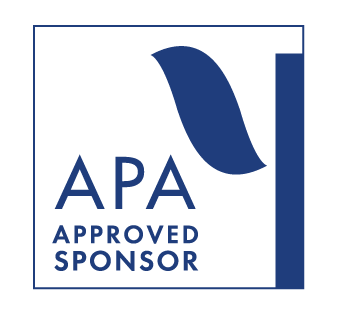June 2025: Webinar Series About the Brain and the Mind
Each webinar takes 3 hours and 3 CE Credits will be awarded for every live webinar by CE credit sponsor to licensed professionals.
 CUE Management Solutions, LLC is approved by the American Psychological Association to sponsor continuing education for psychologists. CUE Management Solutions, LLC maintains responsibility for this program and its content.
CUE Management Solutions, LLC is approved by the American Psychological Association to sponsor continuing education for psychologists. CUE Management Solutions, LLC maintains responsibility for this program and its content. CUE Management Solutions, LLC is recognized by the New York State Education Department’s State Board for Psychology as an approved provider of continuing education for licensed psychologists #PSY-0242.
CUE Management Solutions, LLC is recognized by the New York State Education Department’s State Board for Psychology as an approved provider of continuing education for licensed psychologists #PSY-0242.Instructor Credentials: Elkhonon Goldberg, Ph.D., ABPP., a clinical neuropsychologist and cognitive neuroscientist, and Diplomate of The American Board of Professional Psychology in Clinical Neuropsychology. His critically acclaimed and bestselling books have been translated into 24 languages.
Tuition: $185
Format: three-hour long online webinar
Date and time:
1. Executive Dysfunction in Brain Disorders
June 12 (Thursday) from 1pm to 4pm Eastern Time (noon–3pm Central Time, 10am–1pm Pacific Time)
2. Tourette and ADHD: A New Look at an Old Quandary
June 17 (Tuesday) from 1pm to 4pm Eastern Time (noon–3pm Central Time, 10am–1pm Pacific Time)
3. Traumatic Brain Injury
June 18 (Wednesday) from 1pm to 4pm Eastern Time (noon–3pm Central Time, 10am–1pm Pacific Time)
4. Laterality and Functional Organization of the Brain
June 19 (Thursday) from 1pm to 4pm Eastern Time (noon–3pm Central Time, 10am–1pm Pacific Time)
5. Long NEUROCOVID: What Has Been Learned
June 24 (Tuesday) from 1pm to 4pm Eastern Time (noon–3pm Central Time, 10am–1pm Pacific Time)
Training appropriate for: The course is intended for professionals concerned with mental health and with brain and brain disorders.
The course content level: Intermediate.
Executive Dysfunction in Brain Disorders
June 12 (Thursday) from 1pm to 4pm Eastern Time (noon–3pm Central Time, 10am–1pm Pacific Time)
Executive functions are the most fragile of all cognitive functions. They are affected in a wide range of neurological, psychiatric, neurodevelopmental, and neurogeriatric disorders. In this webinar we will examine how executive functions are affected in various dementias (including Alzheimer’s disease, Lewy body dementia, and Frontotemporal dementia); traumatic brain injury, cerebrovascular disease, neuropsychiatric disorders (including schizophrenia and affective disorders), infectious encephalopathies, seizure disorders, and other clinical conditions, including viral encephalopathies, like neuro-COVID.
Topics to be covered:
Executive dysfunction in dementias (Alzheimer’s disease, Lewy body dementia, Fronto-temporal dementia).
Executive dysfunction in traumatic brain injury (reticulo-frontal disconnection syndrome).
Executive dysfunction in cerebrovascular disorders (CVA, aneurysms).
Executive dysfunction in neurodevelopmental disorders (ADHD, Tourette’s Syndrome).
Executive dysfunction in neuropsychiatric disorders (schizophrenia, affective disorders).
Executive dysfunction in movement disorders (Parkinson’s disease, Huntington’s disease).
Executive dysfunction in infectious encephalopathies (neuro-COVID and others).
Executive dysfunction and seizure disorders.
Executive dysfunction and laterality.
Learning objectives for training:
1. Analyze Executive Dysfunction in Neurodevelopmental Disorders. Differentiate between executive dysfunction in ADHD and other neurodevelopmental disorders.
2. Analyze Executive Dysfunction in Dementias. Describe the patterns of executive dysfunction in Alzheimer’s disease and how they evolve with disease progression.
3. Analyze Executive Dysfunction in Traumatic Brain Injury. Discuss the prevalence and nature of executive dysfunction in mild traumatic brain injury (TBI) and the long-term consequences.
Tourette and ADHD: A New Look at an Old Quandary
June 17 (Tuesday) from 1pm to 4pm Eastern Time (noon–3pm Central Time, 10am–1pm Pacific Time)
The ADHD diagnosis has acquired the status of a fad and is often given too casually and inclusively. Conflation between two distinct classes of clinical phenomena, hyperactivity and exploratory behavior, is a common source of ADHD overdiagnosis. Inspired by early insights by Oliver Sacks, we examine the relationship between frontal-lobe syndromes, Tourette syndrome, and Parkinson’s disease. This synthesis leads to a new understanding of Tourette syndrome and helps identify its distinct subtypes. These subtypes are caused, respectively, by predominant dysregulation in the left vs right fronto-striatal systems, and result in the preponderance of tics vs excessive exploratory behaviors. We examine the difference between
hyperactivity and excessive exploratory behavior, and the potential for diagnostic confusion
between ADHD and Tourette if this difference is ignored.
Topics to be covered:
Overdiagnosis of ADHD. A source of overdiagnosis: conflation of hyperactivity and exploratory behavior. What is the difference?
Are the diagnostic criteria for ADHD too broad? Duality of symptoms in Tourette syndrome: tics vs exploratory behavior.
Are the diagnostic criteria for Tourette too narrow? The triple-decker: Frontal lesions, Tourette syndrome, and Parkinson’s disease.
Introducing “hemi-Tourette” subtypes.
Clinical features of “hemi-Tourette” subtypes.
Clearing up the diagnostic confusion between Tourette and ADHD.
Learning objectives for training:
1. Explain the Relationship Between Tourette and ADHD Diagnoses. Describe the diagnostic criteria for Tourette syndrome and ADHD, highlighting the overlapping symptoms and co morbidities.
2. Describe the Concept of “Excessive Exploratory Behavior” and How It Is Different from Hyperactivity. Define “excessive exploratory behavior” and compare it to the traditional concept of hyperactivity observed in ADHD.
3. Explain the Role of Fronto-Striatal Interaction Breakdown in Tourette Syndrome. Describe the structure and function of the fronto-striatal circuits involved in motor control and behavior regulation.
4. Summarize the Concept of “Hemi-Tourette” Syndrome Variants. Define “hemi-Tourette” syndrome and describe its clinical presentation and diagnostic criteria.
Traumatic Brain Injury
June 18 (Wednesday) from 1pm to 4pm Eastern Time (noon–3pm Central Time, 10am–1pm Pacific Time)
Traumatic Brain Injury (TBI) is a highly prevalent condition sometimes referred to as a “silent epidemic.” In this webinar we will review various types of TBI (closed, open, blast); various causes and unique characteristics of motor vehicle accidents, workplace-related, military and sports TBI; various mechanisms of TBI (diffuse axonal injury, contre-coup, neurometabolic cascade); cognitive characteristics (particularly executive and memory impairment); recovery from TBI and long-term outcomes; and forensic issues commonly associated with TBI.
Topics to be covered:
Epidemiology of traumatic brain injury (TBI). Types of traumatic brain injury (TBI): closed, open (penetrating and perforating), blast. Severity and criteria of traumatic brain injury (TBI): mild, moderate, severe.
Causes of traumatic brain injury (TBI). Mechanisms of traumatic brain injury (TBI).
Focal vs. diffuse components of traumatic brain injury (TBI). Neuroanatomical structures most vulnerable in traumatic brain injury (TBI). Natural course of traumatic brain injury (TBI) and the multiple forms it may take.
Secondary complications in traumatic brain injury (TBI). Cognitive consequences of traumatic brain injury (TBI).
Executive deficit in traumatic brain injury (TBI).
Memory impairment in traumatic brain injury (TBI): anterograde and retrograde amnesia.
Traumatic brain injury (TBI) in sports and Chronic Traumatic Encephalopathy.
Military traumatic brain injury (TBI).
Forensic issues in traumatic brain injury (TBI).
Learning objectives for training:
1. Describe the Types of Traumatic Brain Injury (TBI). Identify and describe the different types of TBI, including concussions, contusions, diffuse axonal injury, and penetrating injuries.
2. Explain the Mechanisms of Traumatic Brain Injury (TBI). Describe the biomechanical forces involved in TBI, including impact, acceleration-deceleration, and rotational forces.
3. List the Multiple Possible Courses of Traumatic Brain Injury (TBI). Identify the different clinical trajectories of TBI, including recovery patterns and potential complications.
4. Explain the Cognitive Characteristics of Traumatic Brain Injury (TBI). Describe the common cognitive deficits associated with TBI, including impairments in attention, memory, and executive functions.
Laterality and Functional Organization of the Brain
June 19 (Thursday) from 1pm to 4pm Eastern Time (noon–3pm Central Time, 10am–1pm Pacific Time)
Laterality is a fundamental feature of brain organization. In this webinar we will discuss why the traditional understanding of hemispheric specialization fails to capture all its essential aspects, and will introduce a new understanding of brain laterality which permits a broader evolutionary perspective. We will review the neuroanatomical and biochemical differences between the two hemispheres; their respective (and changing) roles in cognition across the lifespan; examine gender and handedness differences in laterality; as well as the relationship between hemispheric specialization and emotions. We will also review the nature of hemispheric specialization across species throughout evolution.
Topics to be covered:
Where the traditional notions of hemispheric specialization got it wrong.
Functional laterality and brain anatomy. Laterality throughout evolution.
Novel approaches to hemispheric specialization.
How the two hemispheres develop and age.
Laterality and gender and handedness differences.
Laterality and regulation of emotions.
Learning objectives for training:
1. Describe Biological Differences Between the Cerebral Hemispheres. Identify and describe the morphological differences between the left and right cerebral hemispheres, including structural asymmetries.
2. Explain the Limitations of the Traditional Paradigm. Critically assess the traditional paradigm that associates the left hemisphere with language and the right hemisphere with spatial processing.
3. Explain the Roles of the Two Hemispheres in Learning. Describe the role of the right hemisphere in processing cognitive novelty, including its involvement in attention, perception, and problem-solving.
Long NEUROCOVID: What Has Been Learned
June 24 (Tuesday) from 1pm to 4pm Eastern Time (noon–3pm Central Time, 10am–1pm Pacific Time)
New information will be presented about the evolution of the pandemic, challenges associated
with vaccination, and the variants. As the pandemic evolves, its character changes. Vaccines
are here, but so are the new virus variants. We have a better understanding of the mechanisms
of acute and long NEUROCOVID, and of its impact on various segments of the population.
NEUROVID in children and in the elderly is of particular concern, as well as its being a risk
factor for later-life dementia. The burden of the pandemic on the overall psychological state of
the world is growing, but so are the arsenal of tools to counter its effects. These and other
issues will be discussed in the new webinar.
Topics to be covered:
Evolving pandemic statistics.
Vaccination and its challenges.
Acute NEUROCOVID and the variants.
Long NEUROCOVID.
NEUROCOVID and later-life dementias – growing concerns.
NEUROCOVID in children – recent findings.
Worldwide psychological burden of the pandemic two years later.
Rehabilitation of NEUROCOVID.
Telemedicine and NEUROCOVID.
Learning objectives for training:
1. Describe the worldwide dynamics of the pandemic. Understand the global spread of COVID-19 and its impact on various regions.
2. Describe the challenges of vaccination. Identify the logistical challenges in the distribution and administration of COVID-19 vaccines worldwide.
3. Explain the growing concerns about dementia later in life after COVID-19 infection. Understand the potential long-term neurological impacts of COVID-19, particularly the increased risk of developing dementia.
4. Describe the new findings about NEUROCOVID in children. Identify the neurological symptoms and complications observed in children with Long COVID.
Conflicts of Interest:
There is no known commercial interest or conflict of interest for this program.
Cancellation Policy:
If for any reason you need to cancel, please contact the trainer so we can work together to determine a resolution.
Dr. Elkhonon Goldberg, Ph.D., ABPP: info@lninstitute.org 800-906-5866
Grievance Policy:
We seek to ensure equitable treatment of every person and to make every attempt to resolve grievances in a fair manner. Please email us with your written grievance. Grievances would receive, to the best of our ability, corrective action in order to prevent further problems.
ADA Needs:
If you have any special requests, please email/call: Karen Newell: 707-321-0926 newell@sonic.net
CE and Commercial Support:
CUE Management Solutions, LLC does not have a relevant financial relationship(s) with ineligible companies or other potentially biasing relationships to disclose to learners.
Continuing Education
 CUE Management Solutions, LLC is approved by the American Psychological Association to sponsor continuing education for psychologists. CUE Management Solutions, LLC maintains responsibility for this program and its content.
CUE Management Solutions, LLC is approved by the American Psychological Association to sponsor continuing education for psychologists. CUE Management Solutions, LLC maintains responsibility for this program and its content. CUE Management Solutions, LLC is recognized by the New York State Education Department’s State Board for Psychology as an approved provider of continuing education for licensed psychologists #PSY-0242.
CUE Management Solutions, LLC is recognized by the New York State Education Department’s State Board for Psychology as an approved provider of continuing education for licensed psychologists #PSY-0242.






